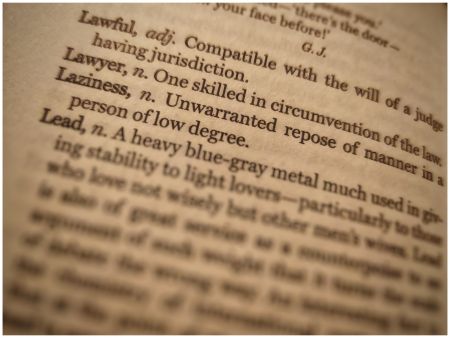Indemnified: Difference between revisions
Amwelladmin (talk | contribs) No edit summary |
Amwelladmin (talk | contribs) No edit summary |
||
| (6 intermediate revisions by the same user not shown) | |||
| Line 1: | Line 1: | ||
A | {{def|Indemnified|/ɪnˈdɛmnɪfʌɪd/|adj|[[File:Legal eagle.jpg|450px|center|thumb|A [[paperist]], yesterday]]}} | ||
1. Descriptive of one who, when entering a [[contract]], fears the sky might fall in on her head, and wishes to have someone to sue should it do so. One who benefits from an ''[[indemnity]]''. <br> | |||
2. One who believes herself immune from existential threat, on account of the existence of a piece of paper. Thus, ''delusional''; a [[paperist]].<br> | |||
3. (''Rare'') Descriptive of a merchant who has identified a contingent cost of performing a contract whose which falls on him, but whose benefit accrues entirely to the other party, and who has persuaded that other party to bear that cost should it arise. For example, a [[custodian]], who wishes to pass to its client any unexpected tax consequences it suffers as a result of having legal title to its client’s [[custody asset]]. | |||
{{sa}} | |||
*[[ | *[[Don’t take a piece of paper to a knife-fight]] | ||
*[[Chicken licken]] | |||
*[[Consequential loss]] | |||
*[[indemnity]] | *[[indemnity]] | ||
*[[indemnified party]] | *[[indemnified party]] | ||
{{c2|Contract|Damages}} | {{c2|Contract|Damages}} | ||
Latest revision as of 09:30, 8 December 2020

|
Indemnified /ɪnˈdɛmnɪfʌɪd/ (adj.)
1. Descriptive of one who, when entering a contract, fears the sky might fall in on her head, and wishes to have someone to sue should it do so. One who benefits from an indemnity.
2. One who believes herself immune from existential threat, on account of the existence of a piece of paper. Thus, delusional; a paperist.
3. (Rare) Descriptive of a merchant who has identified a contingent cost of performing a contract whose which falls on him, but whose benefit accrues entirely to the other party, and who has persuaded that other party to bear that cost should it arise. For example, a custodian, who wishes to pass to its client any unexpected tax consequences it suffers as a result of having legal title to its client’s custody asset.
